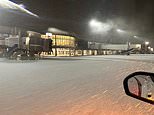Antisemitism protesters will gather outside three London universities due to host a divisive United Nations official who has said Hamas supporters have 'a right to resist' and that Israel is like Nazi Germany.
Italian academic and lawyer Francesca Albanese, who serves as the UN's special rapporteur on the occupied Palestinian territories, will embark on a speaking tour of the UK next week.
She is set to appear at the London School of Economics (LSE) and School of Oriental and African Studies (SOAS) on Monday and Queen Mary University of London on Tuesday to present the 'genocide in Gaza' and its relationship with international law.
But antisemitism advocates say Albanese is a controversial choice of speaker who has made 'indefensible' and 'repulsive' comments about the conflict between Israel and Palestine, both before and after the events of October 7.
In 2022, Albanese reportedly addressed a Hamas-organised conference in Gaza in which she stated, 'You have a right to resist this occupation.'




Representatives from Hamas and Palestinian Islamic Jihad - which are both proscribed as terrorist organisations by the UK Government - were present.
In February, Albanese was condemned by the French Foreign Ministry after she dismissed French President Emmanuel Macron's description of the October 7 attack as an 'anti-Semitic massacre.'
She wrote, in French: 'The "greatest anti-Semitic massacre of our century"? No, Mr. @EmmanuelMacron. The victims of 10/7 were not killed because of their Judaism, but in response to Israel's oppression.'
Albanese previously caused ire in 2014 when she penned an open letter referring to America having been 'subjugated by the Jewish lobby'.
And, according to The Times of Israel, that same year she also wrote in a now-hidden post on Facebook directed at the BBC that 'the Israeli lobby is clearly inside your veins and system.'
She later apologised for those comments, telling the Times of Israel: 'Some of the words I used, during Israel's offensive on the Gaza Strip in 2014, were infelicitous, analytically inaccurate and unintendedly offensive.
'I distance myself from these words, which I would not use today, nor have used as a UN special rapporteur.'
According to advocacy group Campaign Against Antisemitism, some of Albanese's comments have repeatedly breached the International Definition of Antisemitism (IHRA), which has been adopted by the British government.
A spokesperson for Campaign Against Antisemitism told MailOnline last night that Albanese should 'not be welcome to spread her repugnant message on our campuses.'
In a statement, they said: 'By now, Francesca Albanese's indefensible past comments about the "Jewish lobby" and repulsive comparisons between the Nazis and the Jewish state are well known.
'There can be no excuse for inviting her to address students on campus in light of her views, which she has unrepentantly promoted for decades.'
The group said a recent polling of young people found almost one in ten aged between 18 and 24 have a 'favourable' view of Hamas.



CAA added that 'universities need to be doing more to stop the spread of antisemitic extremism on campuses, not inviting those who appear to endorse it into their lecture theatres'.
The statement continued: 'We are at a tipping point and Jewish students, who have been facing over a year of hatred on campus, need us.
'We invite everyone to join us and let Ms Albanese know that she is not welcome to spread her repugnant message on our campuses.'
The Board of Deputies, which represents British Jewry, told the Jewish Chronicle it was 'deeply worrying' that she had been invited to 'spread her poison' on British university campuses.

News of Albanese's UK tour comes as the BBC last night provoked anger by rejecting calls to describe Hamas as terrorists, saying it would only use this term when it is attributed to others.
A proposed new version of its editorial guidelines says the word 'terrorist' should only be used when 'quoting or citing its use by others', a continuation of the current rules.
This is despite the huge row caused in the aftermath of the October 7 massacre by Hamas in Israel, where the corporation refused to call the attackers terrorists.
That decision was made even though the British government classes Hamas as a proscribed terrorist organisation.
The row saw the president of Israel, Isaac Herzog, condemn the BBC for its 'atrocious' refusal to brand Hamas as a terrorist group, while Chief Rabbi Ephraim Mirvis accused broadcasters of trying to 'wilfully mislead' by not using the term.
Broadcaster and journalist Jonathan Sacerdoti, who is also a campaigner against antisemitism, said: 'The term 'terrorism' is not a label of disapproval but a description of methods and actions.
'To most normal humans it's totally clear when it should be used and it can be use entirely objectively and factually.'
He added: 'The year since October 7th should have helped the BBC figure out a better approach.'
MailOnline has contacted Albanese, SOAS, LSE and Queen Mary University of London for comment.












